Ditapis dengan

Peran matematika, sains dan teknologi dalam kebencanaan
Kita menyadari bahwa negara kita merupakan negara bahari yang terdiriatas lebih dari 17.000 pulau dengan garis pantai yang membentang sepanjang lebih dari 99.000 km. Secara geologi Indonesia memiliki banyakpatahan gempa karena dikelilingi oleh tiga lempeng tektonik, yaitu lempengIndo-Australia, lempeng Eurasia, dan lempeng Pasifik yang pertemuannya berada di laut. Di samping itu, wilayah Indone…
- Edisi
- -
- ISBN/ISSN
- 9786023927203
- Deskripsi Fisik
- xiv, 183p. : ill.
- Judul Seri
- -
- No. Panggil
- 510 PER p

Accessible elements:teaching science online and at a distance
The importance of science education and science literacy is rising rapidly. As a society and as individuals, having access to it has become absolutely vital. Established educational routes of the past have served us well, but their limitations are becoming more apparent. There is very real and growing demand by students for more flexible approaches to learning science. Online and distance…
- Edisi
- -
- ISBN/ISSN
- 9781897425480
- Deskripsi Fisik
- -
- Judul Seri
- -
- No. Panggil
- 372.21 KEN a

Genome editing in neurosciences
Innovations in molecular biology are allowing neuroscientists to study the brain with unprecedented resolution, from the level of single molecules to integrated gene circuits. Chief among these innovations is the CRISPR-Cas genome editing technology, which has the precision and scalability to tackle the complexity of the brain. This Colloque Médecine et Recherche has brought together experts f…
- Edisi
- -
- ISBN/ISSN
- 9783319601922
- Deskripsi Fisik
- xi, 123p. : ill.
- Judul Seri
- -
- No. Panggil
- 572.8 GEN g

Free will, causality, and neuroscience
Neuroscientists often consider free will to be an illusion. Contrary to this hypothesis, the contributions to this volume show that recent developments in neuroscience can also support the existence of free will. Firstly, the possibility of intentional consciousness is studied. Secondly, Libet’s experiments are discussed from this new perspective. Thirdly, the relationship between free will, …
- Edisi
- -
- ISBN/ISSN
- 9789004409965
- Deskripsi Fisik
- viii, 184p. : ill.
- Judul Seri
- -
- No. Panggil
- 123.5 FRE f

Transforming institutions :undergraduate STEM education for the 21st century
Higher education is coming under increasing scrutiny, both publically and within academia, with respect to its ability to appropriately prepare students for the careers that will make them competitive in the 21st-century workplace. At the same time, there is a growing awareness that many global issues will require creative and critical thinking deeply rooted in the technical STEM (science, tech…
- Edisi
- -
- ISBN/ISSN
- 9781557537249
- Deskripsi Fisik
- ix, 501 p.; 22 cm.
- Judul Seri
- -
- No. Panggil
- 507.1173 TRA t

Representation in cognitive science
Nicholas Shea.
- Edisi
- -
- ISBN/ISSN
- 9780198812883(hbk.)
- Deskripsi Fisik
- xi, 292 pages : illustrations ; 24 cm
- Judul Seri
- -
- No. Panggil
- -
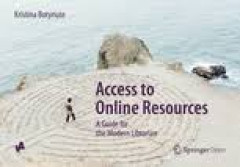
Access to online resources:a guide for the modern librarian
access management; online resources; library technology; access protocols; identity management; authentication; authorisation; troubleshooting; SAML
- Edisi
- -
- ISBN/ISSN
- 9783319739908
- Deskripsi Fisik
- -
- Judul Seri
- -
- No. Panggil
- 025 BOT a
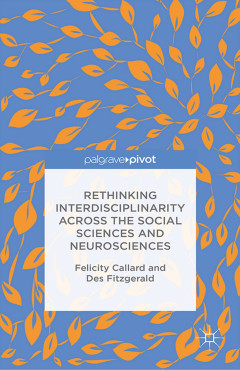
Rethinking interdisciplinarity across the social sciences and neurosciences
This book offers a provocative account of interdisciplinary research across the neurosciences, social sciences and humanities. Setting itself against standard accounts of interdisciplinary 'integration,' and rooting itself in the authors' own experiences, the book establishes a radical agenda for collaboration across these disciplines. Rethinking Interdisciplinarity does not merely advocate int…
- Edisi
- -
- ISBN/ISSN
- 9781137407962
- Deskripsi Fisik
- x, 157p. : ill.
- Judul Seri
- -
- No. Panggil
- 001 CAL r
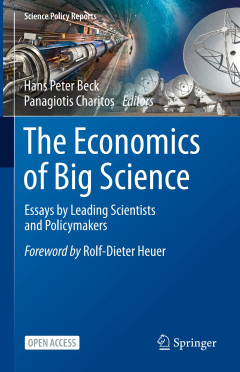
The economics of big science :essays by leading scientists and policymakers
The essays in this open access volume identify the key ingredients for success in capitalizing on public investments in scientific projects and the development of large-scale research infrastructures. Investment in science – whether in education and training or through public funding for developing new research tools and technologies – is a crucial priority. Authors from big research lab…
- Edisi
- -
- ISBN/ISSN
- 9783030523916
- Deskripsi Fisik
- viii, 137p. : ill.
- Judul Seri
- -
- No. Panggil
- 330 ECO e
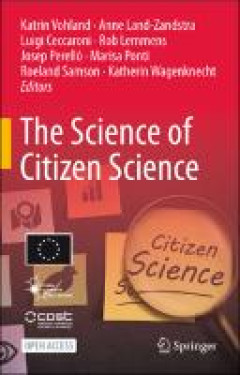
The science of citizen science
This open access book discusses how the involvement of citizens into scientific endeavors is expected to contribute to solve the big challenges of our time, such as climate change and the loss of biodiversity, growing inequalities within and between societies, and the sustainability turn. The field of citizen science has been growing in recent decades. Many different stakeholders from scientist…
- Edisi
- -
- ISBN/ISSN
- 9783030582784
- Deskripsi Fisik
- vii, 529p. : ill.
- Judul Seri
- -
- No. Panggil
- 303.483 SCI s
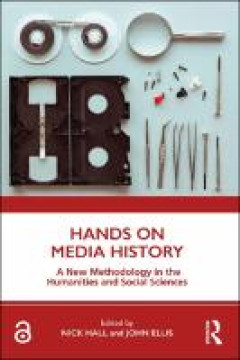
Hands on media history:a new methodology in the humanities and social sciences
"Hands on Media History explores the whole range of hands on media history techniques for the first time, offering both practical guides and general perspectives. It covers both analogue and digital media; film, television, video, gaming, photography and recorded sound. Understanding media means understanding the technologies involved. The hands on history approach can open our minds to new per…
- Edisi
- -
- ISBN/ISSN
- 9781351247412
- Deskripsi Fisik
- xvii, 240p.: ill.
- Judul Seri
- -
- No. Panggil
- 302.23 HAN h

Perspectives on science and culture
"Edited by Kris Rutten, Stefaan Blancke, and Ronald Soetaert, Perspectives on Science and Culture explores the intersection between scientific understanding and cultural representation from an interdisciplinary perspective. Contributors to the volume analyze representations of science and scientific discourse from the perspectives of rhetorical criticism, comparative cultural studies, narratolo…
- Edisi
- -
- ISBN/ISSN
- 9781557537973
- Deskripsi Fisik
- 308 p.; 23 cm.
- Judul Seri
- -
- No. Panggil
- 306.45 RUT p

Knowledge and the norm of assertion:an essay in philosophical science
- Edisi
- -
- ISBN/ISSN
- 9781783741861
- Deskripsi Fisik
- x + 116 p.; 23 cm.
- Judul Seri
- -
- No. Panggil
- 306.44 JOH k
- Edisi
- -
- ISBN/ISSN
- 9781783741861
- Deskripsi Fisik
- x + 116 p.; 23 cm.
- Judul Seri
- -
- No. Panggil
- 306.44 JOH k

Hanging on to the edges :essays on science, society and the academic life
What does it mean to be a scientist working today; specifically, a scientist whose subject matter is human life? Scientists often overstate their claim to certainty, sorting the world into categorical distinctions that obstruct rather than clarify its complexities. In this book Daniel Nettle urges the reader to unpick such distinctions—biological versus social sciences, mind versus body, and …
- Edisi
- -
- ISBN/ISSN
- 9781783745821
- Deskripsi Fisik
- 262 p.; 23 cm.
- Judul Seri
- -
- No. Panggil
- 802.4 NET h
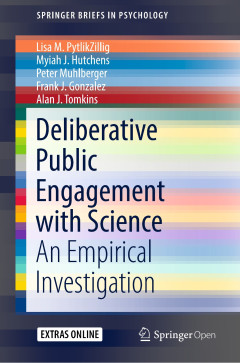
Deliberative public engagement with science :an empirical investigation
This compact open access reference delves beyond popular concepts of educated consumers and an informed public by examining the science behind deliberative engagement. Using data from four longitudinal studies, the authors assess public engagement methods in deliberative discussions of ethical, legal, and social issues concerning innovations in nanotechnology. Coverage includes the theoretical …
- Edisi
- -
- ISBN/ISSN
- 9783319781600
- Deskripsi Fisik
- xi, 129p. : ill.
- Judul Seri
- -
- No. Panggil
- 155.2 PYT d

Public involvement in knowledge generation:citizen science opportunities in t…
- Edisi
- -
- ISBN/ISSN
- 9781789060492
- Deskripsi Fisik
- -
- Judul Seri
- -
- No. Panggil
- 333.9113 BRO p
- Edisi
- -
- ISBN/ISSN
- 9781789060492
- Deskripsi Fisik
- -
- Judul Seri
- -
- No. Panggil
- 333.9113 BRO p

Excavating the future :archaeology and geopolitics in contemporary North Amer…
Well-known in science fiction for tomb-raiding and mummy-wrangling, the archaeologist has been a rich source for imagining ‘strange new worlds’ from ‘strange old worlds.’ But more than a well-spring for SF scenarios, the genre’s archaeological imaginary invites us to consider the ideological implications of digging up the past buried in the future. A cultural study of an array of very…
- Edisi
- -
- ISBN/ISSN
- 9781786948731
- Deskripsi Fisik
- XV, 228 p.
- Judul Seri
- -
- No. Panggil
- 791.43615097 MAL e
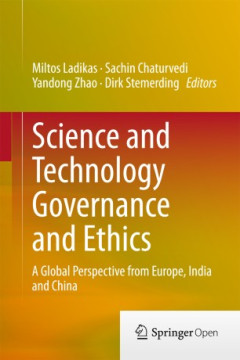
Science and technology governance and ethics :a global perspective from Europ…
This book analyzes the possibilities for effective global governance of science in Europe, India and China. Authors from the three regions join forces to explore how ethical concerns over new technologies can be incorporated into global science and technology policies. The first chapter introduces the topic, offering a global perspective on embedding ethics in science and technology policy. Cha…
- Edisi
- -
- ISBN/ISSN
- 9783319146935
- Deskripsi Fisik
- viii, 173p. : ill.
- Judul Seri
- -
- No. Panggil
- 509 MIL s

The challenge of chance :a multidisciplinary approach from science and the hu…
This book presents a multidisciplinary perspective on chance, with contributions from distinguished researchers in the areas of biology, cognitive neuroscience, economics, genetics, general history, law, linguistics, logic, mathematical physics, statistics, theology and philosophy. The individual chapters are bound together by a general introduction followed by an opening chapter that surveys 2…
- Edisi
- -
- ISBN/ISSN
- 9783319263007
- Deskripsi Fisik
- vii, 276p. : ill.
- Judul Seri
- -
- No. Panggil
- 123.3 KLA t

E-science :open, social and virtual technology for research collaboration
This open access book shows the breadth and various facets of e-Science, while also illustrating their shared core. Changes in scientific work are driven by the shift to grid-based worlds, the use of information and communication systems, and the existential infrastructure, which includes global collaboration. In this context, the book addresses emerging issues such as open access, collaborati…
- Edisi
- -
- ISBN/ISSN
- 9783030662622
- Deskripsi Fisik
- xii, 185p. : ill.
- Judul Seri
- -
- No. Panggil
- 507.2 ELE e
 Karya Umum
Karya Umum  Filsafat
Filsafat  Agama
Agama  Ilmu-ilmu Sosial
Ilmu-ilmu Sosial  Bahasa
Bahasa  Ilmu-ilmu Murni
Ilmu-ilmu Murni  Ilmu-ilmu Terapan
Ilmu-ilmu Terapan  Kesenian, Hiburan, dan Olahraga
Kesenian, Hiburan, dan Olahraga  Kesusastraan
Kesusastraan  Geografi dan Sejarah
Geografi dan Sejarah